HORROR NOIRE Interview: Co-Writer/Producer Ashlee Blackwell on the Importance of Representation in Cinema
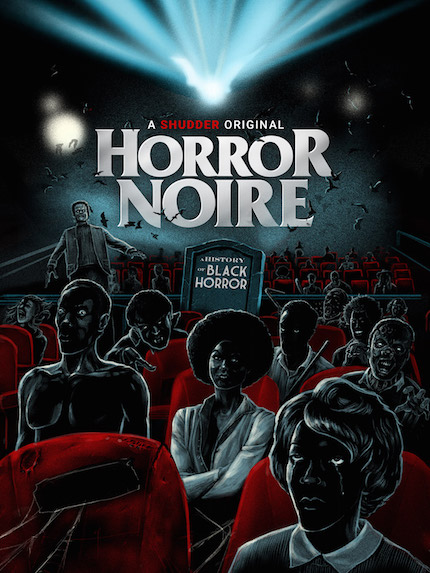
The vital documentary Horror Noire: A History of Black Horror, directed by Xavier Burgin and based on Robin R. Means Coleman’s book of the same name, invites us to know the perspective of African-Americans towards horror films.
With a chronological structure, ranging from the oldest horror titles with black characters (such as Son of Ingagi from 1940) to the first footage of Jordan Peele’s upcoming film Us, Horror Noire: A History of Black Horror brings together an excellent group of interviewees.
Directors (Peele himself, Ernest Dickerson, William Crain, Rusty Cundieff), actresses and actors (Rachel True, Tony Todd, Ken Foree, Keith David) and specialists (including Coleman herself) provide a unique film dissection, certainly focused on the representation in horror cinema of the black minority in a country like the United States where racism is inherent in its history and, naturally, has been reflected on the big screen since the first decades of the art (D.W. Griffith’s The Birth of a Nation as the perfect example).
Analyzing both the problems (from invisibility, problematic representation, to the countless tropes) and the moments that positively changed the course of history (from Night of the Living Dead, Blacula, Tales from the Hood to Get Out), in addition to highlighting lesser-known films (Ganja & Hess, Eve's Bayou or Bones); the documentary basically makes us understand the importance of fair representation in a massive medium, undoubtedly powerful as cinema.
Horror Noire: A History of Black Horror is now available to stream on Shudder [more about that here] and to continue the conversation around it, I interviewed Ashlee Blackwell from the Graveyard Shift Sisters website (which “documents black women in horror") and who also co-wrote, co-produced and stars in the documentary.
ScreenAnarchy: It seems that a documentary like this one could only be made in this positive time for black people in the horror genre, specially thanks to the huge success of GET OUT…
Ashlee Blackwell: This is the best moment to actually have this come out because there was only a few of us who were really into investigating this kind of topic and now everyone has a general interest or are kind of enlightened by what we were able to do with the documentary or, prior to that, what we were able to do with our website and whatever we were doing.
Phil Nobile Jr., who’s the editor-in-chief of Fangoria, he was at the right place at the right time, he worked in a production company in the same town that we both live in [Philadelphia], and had the liberty of saying, “I want to do this because Get Out is such an important moment, now I want to catch a light on it the best way I can right now.”
It was perfect for him, as he just wanted to get the right people on board, which included me, and he first spoke to me because, again, we were both living at close proximity with each other, we had a great friendship prior to actually be working with each other. One day he said, “hey, would you love to just come on board?”, and I said, “yes.” I had no idea what that entailed because I never did anything involving production in any capacity before, really, so that’s kind of how I came on board to do this.
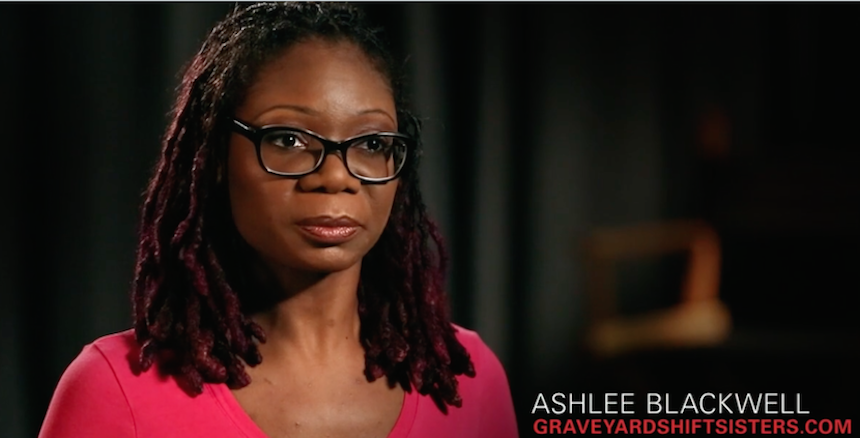
My presence is really about kind of filling in the gaps. I mean, I wasn’t like jumping to be on camera, I really just wanted to listen to other people’s perspective. If I felt that there were spaces in the documentary that didn’t feel like needed my voice because it was already covered, I never lean to be a part of everything. I’m a student first and then a teacher second.
Watching the documentary, you feel how representation in cinema is something extremely important, but maybe some people don’t really think about that. You mention in the film how some early horror movies are great but at the same time are full of tropes and clichés about black people. I think that the power of cinema, the power of representation, is the key to HORROR NOIRE: A HISTORY OF BLACK HORROR, so how important is for you to communicate this to people?
Yeah, I mean, when people who spend a lifetime seeing people who look like themselves everywhere they go, even on television, in movies, it’s very difficult for them to understand what it's like for a person, of any other color, in any other category, to have the opposite experience. That’s why there’s such a comunal celebration, specifically talking about black people right now, to see these images on the big screen, on a mainstream platform.
It almost feels life-affirming, because when you don’t see yourself at all, you don’t feel like you matter, you don’t feel like you’re visible, and that can be a very frustrating experience, that kind of goes down inevitably in a negative emotion. To come out of that, and just be yourself, it’s really important.
It’s specifically said on the documentary that if you spend a lifetime with characters that don’t look like you on screen, specially in horror, and now you’re finally seeing more heroes than you did before, it’s invigorating, there’s no other way to describe it, it’s really about the emotion. It almost makes you feel alive, it’s an extension of what you being desiring your entire life, to see those variety of representation of yourself on screen; it’s not black or white, we are angry sometimes, we are villains, we are heroes.
That’s why representation is so important, especially in horror because horror really is about digging into those human fears, that’s what really gets people. Strive to survive is a very universal feeling and that’s what Get Out I know did for a lot of people.
The documentary goes back to THE BIRTH OF A NATION and has a chronological structure. The history of black horror is certainly very conflictive, the film jumps from like the 1940s to 1968 and NIGHT OF THE LIVING DEAD because there’s basically nothing much in between. So in a general sense what are for you the key moments in the history of black horror?
It was great to see black characters in 1980s films, but in horror, the slasher films, very rarely did you see a character survive and even if he did survive, he did very little to work out of a trope of black horror, like Rodger (Alvin Alexis) in Night of the Demons.
It was great to see a different variety of black women on the screen, in 1980s slashers, but then that girl was Sheila (Toy Newkirk) in A Nightmare on Elm Street 4: The Dream Master, but she ends up being one of the first characters to die, so she didn’t get a lot of screen time and much of a character arc, but at the same time she made a huge impact on our generation of black fans.
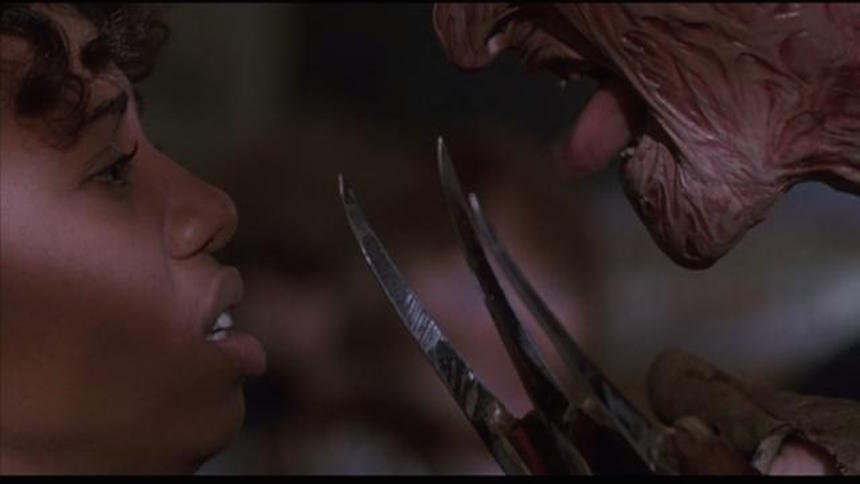
The documentary will eventually make people get to know some films that they probably never heard of before. In my case, I just watched BONES, as it was a movie that just wasn’t on my radar even if I like Snoop Dogg and know the director [Ernest Dickerson]. You mention, for example, how the CANDYMAN sequels are kind of overlooked, so in that sense, what are the films you are more eager for the audience to discover?
A lot of them. I like the fact that we did a little bit, not a lot but a little bit in the documentary to expand the concept of what horror is.
It’s almost always debatable for Eve’s Bayou, I’ve defend the way it kind of lean into horror, more so on Twitter. I’ve pushing for this for years: horror is a lot more expansive of what we imagine. We have to go back to what it is: at its core horror is about evoking fear, about displaying fear, specially within its characters. So Eve’s Bayou is a movie that often plays with its supernatural elements, about voodoo, but also you’re looking at the first kind of awakening in this really young girl (Jurnee Smollett), she’s not quite into puberty yet but she’s getting there, she’s being exposed to all of these images, natural and supernatural that are really frightening to her, and again that’s horror. It’s very much a drama but it’s also very much horror as well.
Horror is displayed in a lot of other different genres and I want there to be more of an awakening for folks to understand that this is what the genre is, it's always going to incorporate other aspects because it’s always going to be in some sort of a human story.
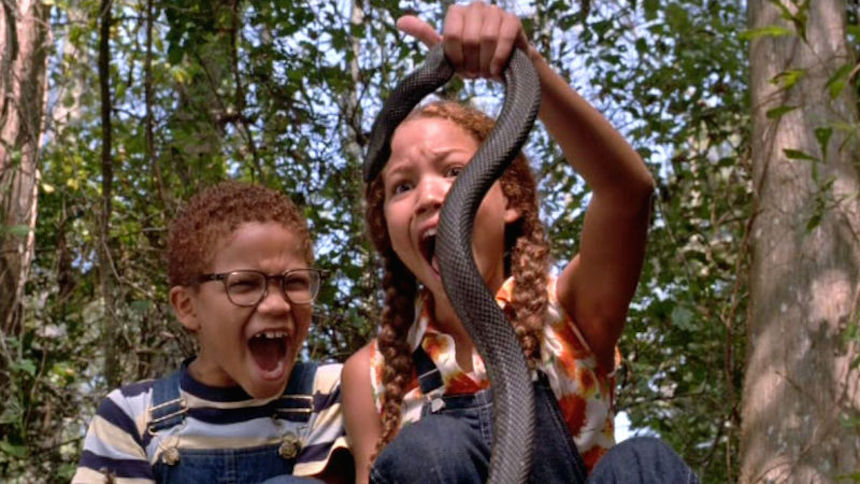
You’re very prominent when talking about the role of black women in horror. For instance, you mention the importance of having in the 1990s the first black final girl [Jada Pinkett Smith’s character in TALES FROM THE CRYPT: DEMON KNIGHT] and how there were more “fearless women” on screen after that. Can you comment on how do you feel about the current representation of black women in horror?
I think right now is going great. I feel like I want to push more people toward the independent horror filmmakers, specifically black women, because that’s where you’re going to see some really interesting and fresh, and I’m talking about super fresh images of black women in horror films.
Even with the Octavia Spencer trailer for Ma, that’s something I didn’t expect, I heard she was going to be in a movie called Ma, I heard it was going to be horror, I thought she was probably going to be a secondary character or supporting character, and now that I saw the trailer, she’s the main character and she looks like the antagonist, so I was blown away! I was not expecting that.
We talked about black heroes, but now we also see what I've wanting to see, various perspectives, characters and visions in horror with black women. This was a nice little surprise, to see Octavia Spencer take the front and center in a really interesting movie that I hope have a lot more interesting parts, I’m hoping the trailer isn’t giving too much away.
There’s also Suicide by Sunlight by Nikyatu Jusu, that just premiered at Sundance, a vampire film, specifically with black vampires and how they navigate the world. I’m really excited about where black women are.
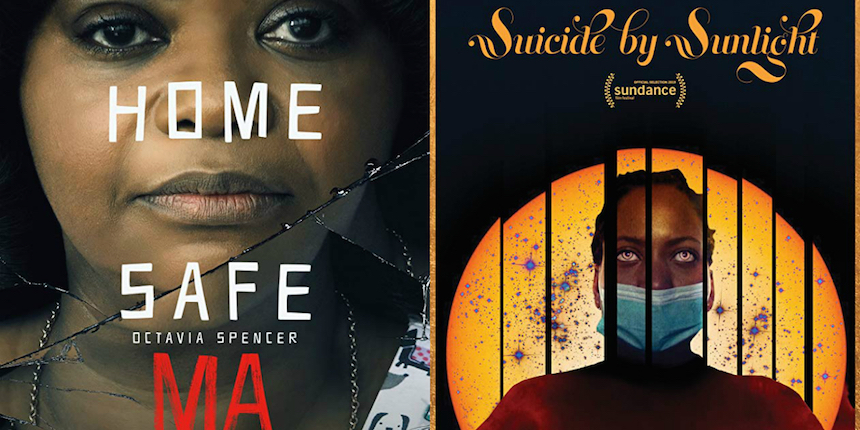
In the end, I think it’s a very positive documentary, with the appearance of films like ATTACK THE BLOCK that were impossible to conceive in the past. In general, what do you think about the evolution of black horror over the years?
I’m happy about it. I can’t predict the future. I’m more cheering on the possibility that more people who work full-time jobs, go home and shoot a movie on the weekend and put in on Vimeo. Those are the people I want to see on the come up.
It’s great to see well-known names, but I’m not driven by celebrity, I’m driven by the work I’m able to see from people who really have a vision and are talented. I want Hollywood to give an opportunity to people who are really passionate about the genre, those are the black people I want to see on the come up, because there’s a lot of cool different things that are coming out.
Finally, of all the films that are mentioned in the documentary, what are the five you think are essential to understand the role of black people in horror?
Son of Ingagi, Ganja & Hess, Tales from the Hood, The Girl with All the Gifts and, hell, Us.







